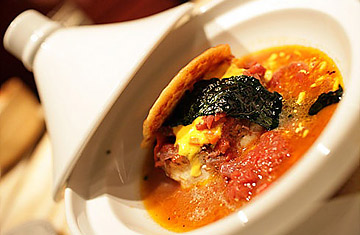
Oleana in Cambridge, Mass., serves monkfish tagine with Moroccan spices and chickpea crepe.
As one of the millions of Americans who don't like falafel, I feel somewhat chagrined today. Like many of my countrymen, I made a series of mistakes, errors of perception that drove me further into the darkness. First of all, I thought the fried chickpea balls I had tried were competently made, when in fact they weren't. Then, I thought this bad falafel was a good representative of Middle Eastern cooking, at least of the kind I was likely to encounter at restaurants. Since most of the kebabs, hummus, and other Middle Eastern staples were no better than the falafel that I tended to encounter in New York, I felt justified in thinking, and even saying, that I didn't like Middle Eastern food. My wife, who has Israeli dual citizenship, thought this misguided; but then she said the same thing about buying an Audi on Craigslist, and look how right I was about that!
Then I ate at Oleana, and my whole perspective changed. The Cambridge, Mass., restaurant is run by the James Beard Award–winning chef Ana Sortun, but I should note that Oleana is not the first or even necessarily the best modern Middle Eastern restaurant going. Michael Solomonov's Zahav, in Philadelphia, and Philippe Massoud's Ilili, in New York, are both examples of chefs trying to push one of the world's most complex and ancient cuisines into the culinary mainstream. (Massoud's charcoal-roasted lamb shawarma is so good, I recruited him to serve it at the Meatopia festival I organized last year.) Middle Eastern food, these chefs are trying to say, is in a place right now where Italian food was 50 years ago; those crusty pea-balls in that leathery pita are the exact equivalents of the leaden meatballs in soggy spaghetti that used to pass for Neapolitan cooking.
I was working on a project for another Time Inc. publication, Cooking Light, and was on the lookout for restaurants where you could eat well without getting fat. I had always wanted to like Middle Eastern food for that reason. Oleana certainly fit the bill, even to the extent of having a vegetarian tasting menu. But my lifelong disinterest in Middle Eastern flavors and foods got in the way. What can I tell you? Hummus, at the end of the day, is bean paste, and who gets excited about bean paste? But I was recently informed that hummus isn't supposed to be eaten straight-up any more than crab dip is. It's also supposed to have tahini (sesame paste) in it too, and other flavors besides. An orthodox Jewish gourmet store in my Brooklyn neighborhood sold me a product called hummus mashbachah that changed my whole opinion of hummus in one bite. It was smooth and rich as pudding, with a topping of spicy harissa (hot sauce) that added an elixir of vitality. I would stand at the refrigerator and eat it with a spoon — I know it's wrong, but I do it anyway because it's so good!
Middle Eastern food is genuinely light. That's why so many people want to like it. There's little in the way of butter, or animal fat, or sugar, just to name my three favorite things in the world. At Oleana, these elements all appear, but they're used judiciously, in the service of what Sortun calls the food of the Arabic Mediterranean, the rim of that sea that was occupied at one or another time by the Moors. Technically, that would include Sicily, the Iberian peninsula, Lebanon, modern Israel, Tunisia, Morocco, and other countries, but the cuisine Oleana draws on most profitably is that of Turkey, which functions for this tradition very much the way Paris does for that of France — as its focal point and most polyglot sector.
Maybe it's because Sortun spent a lot of time in Turkey, and absorbed the country's cosmopolitan vibe, but her hummus has a tiny bit of butter in it and comes paired with basturma, Turkish air-dried beef — with a weight and a lushness you didn't see coming. The seasonings, like za'tar and sumac, which I sprinkled altogether too delicately on the food at other restaurants, at Oleana are present in assertive amounts, so you really "get it." The portions are small but intense. Even the salads are packed with texture and impact; for example, its fatoush comes with baked pita chips, sugar-stripe beets and a gusher of sumac seasoning. The food looks beautiful, too, so you can go there either solo or on a date; but more importantly, it feels like legitimate restaurant food, not just an ethnic outlier for foodies or grad students.
Somewhere out there is the Oleana of Austro-Hungarian food, the Oleana of Ethiopian food, the Oleana of Scandinavian cuisine. Right now, I'm still stuck in those traditions where I was with "Arabic Mediterranean" food a week ago — with schnitzels, weird stews, and reindeer and rye bread standing in for falafel. But maybe becoming more enlightened won't be as painful as I thought it would be.
Josh Ozersky is a James Beard Award—winning food writer and the author of The Hamburger: A History. His food video site, Ozersky.TV, is updated daily. He is currently at work on a biography of Colonel Sanders. Taste of America, Ozersky's food column for TIME.com, appears every Wednesday.
